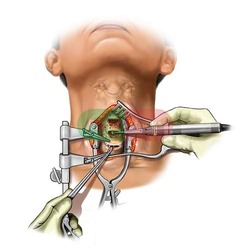Neurosurgeon may recommend cervical spine surgery to relieve neck pain, numbness, tingling and weakness, restore nerve function and stop or prevent abnormal motion in your neck.
Your surgeon does this by removing a disc or a bone and fusing the vertebrae together with a bone graft either in front of or behind the spine. The bone graft may be one of two types: an autograft (bone taken from your body) or an allograft (donor bone from a bone bank). Sometimes metal plates and screws are also used to further stabilize the spine. These techniques are called instrumentation. When the vertebrae have been surgically stabilized, abnormal motion is stopped and function is restored to the spinal nerves. An alternative to spinal fusion is a cervical disc replacement using an artificial disc that enables neck motion and stabilizes the spine.
Surgery for Cervical Spine

Cervical Spine Surgery Approaches
The cervical spine can either be approached from the front (anterior approach) or from the back (posterior approach). In general, where possible, most surgeons favor an anterior approach for most conditions.
An anterior approach results in less disruption of the normal musculature and is also easier to maintain the normal alignment of the spine.
What are the Reasons for Cervical Spine Surgery?
Cervical spine surgery may be indicated for a variety of spinal neck problems. Generally, surgery may be performed for degenerative disorders, trauma or instability. These conditions may produce pressure on the spinal cord or on the nerves coming from the spine.
What are the Potential Complications of Cervical Spine Surgery?
As with any operation, there are risks involved with cervical spine surgery. Possible complications include injury to your spinal cord, nerves, esophagus, carotid artery or vocal cords; non-healing of the bony fusion; failure to improve; instrumentation breakage and/or failure; infection; bone graft site pain. Any of these complications may lead to more surgery.
Other complications may include phlebitis in your legs, blood clots in the lungs or urinary problems. Rare complications include paralysis and possibly death. Your surgeon will discuss potential risks with you before asking you to sign a consent form.
